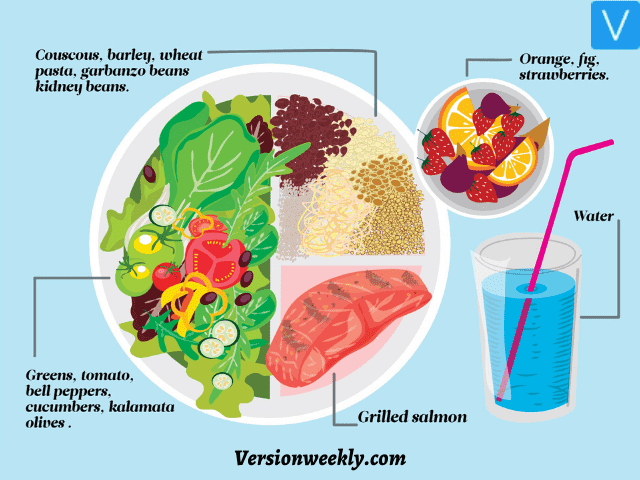Merits Of A Mediterranean Diet
“A Mediterranean diet consists predominantly of fresh fruits and vegetables, heart healthy oils, seafood, nuts and grains”
A Mediterranean diet goes beyond a quick list of superfoods and endorses a healthy lifestyle that should be incorporated into your daily routine. The diet plan is influenced by ingredients and recipes commonly used in a Mediterranean style of cooking and the emphasis is on being physically active and enjoying the pleasure of eating healthy and delicious meals with family and friends.
Mediterranean Diet
However, the mention of Mediterranean food most often may conjure up a picture of an elaborate Greek fare with multiple courses and flowing red wine, decadent Turkish baklava or sinful Italian pizzas and pastas. This picture, though is a far cry from an authentic, traditional Mediterranean diet that consists predominantly of fresh fruits and vegetables, heart healthy oils, seafood, nuts and grains.
While the prudence of the Mediterranean diet dates back to centuries, the concept has witnessed ardent followers (among both medical professionals and health conscious people) in recent years. It all began in the early nineties when researchers compared a typical American (or western) diet and health with those of people living along the Mediterranean coastline – from the southeastern European countries of Greece, Crete and Italy.
They noted that the people from the Mediterranean countries not only enjoyed a longer life and better cardiovascular health – the rates of chronic diseases such as cancer, diabetes, obesity and cognitive decline were also much lower than the world indices. This was due to their unique food pyramid, active lifestyle and less indulgence in stimulants and processed foods.
General Principles
At the base of the Mediterranean food pyramid is fibre-dense vegetables and fresh fruits with a recommended intake of eight-ten servings per day. Next in the pyTamid is wholegrains such as whole wheat, millets, oats, and barley in the form of breads, pasta, couscous and breakfast cereals.
Legumes (lentils, peas and beans), fish and nuts are the preferred sources of protein in the diet and red meats, butter and sugary drinks and desserts are limited as occasional treats. Water is considered to be the fluid of choice and red wine as a regular accompaniment with meals.
Sample Mediterranean Menu (For A Day)
| Meal | Eating Choices |
| Breakfast | Oats with Greek yogurt (or low fat curd) or spinach-egg white omelette and fresh fruits |
| Lunch | Grilled fish with stir fried vegetables and brown rice or baked beans, multigrain bread and fresh green salad with roasted walnuts |
| Evening | Pumpkin and lentil soup or herbed chickpea salad |
| Dinner | Mediterranean smoked chicken with fresh olives, feta cheese, roasted eggplant and cherry tomatoes |
Foods Included
Fish
Being close to the coastline ensures that fish and seafood feature as a regular in this diet. Fish is an excellent source of omega 3 fatty acids that reduces the risk of many degenerative diseases and keeps the heart healthy. Consuming fatty fish such as mackerel (bangda), surmai, salmon and trout at least three times a week is suggested.
Olive Oil
The focus is on healthy fats and oils and avoiding foods with saturated fat and trans fat. Olive oil is rich in mono unsaturated fatty acids that has been associated with lower triglyceride and bad LDL cholesterol levels, improved health of blood vessels and cardiac muscles and delayed signs of ageing.
Beans And Nuts
Though quite high in calories and fat content, nuts contain the right proportion of MUFA and PUFA and a range of health promoting vitamins (A and E) and minerals such as calcium, magnesium, zinc and selenium, Thus, one may enjoy a handful of peanuts or six to eight almonds a day.
Beans are regularly consumed as soups, stews and salads in Mediterranean cuisine, A low glycemic food, beans are also high in fibre, protein and calcium content and help to improve digestion, support healthy bones and reduce inflammation.
Fruits And Vegetables
An abundance of seasonal fruits and fresh vegetables are the mainstay in a Mediterranean diet for health reasons.Switching to fruits as snacks and desserts and adding two three vegetable exchanges at each meal is recommended.
Red Wine
Red wine (a glass or two per day) is loaded with antioxidant, anti-inflammatory and anti-ageing properties. However, if you don’t drink alcohol, there is no need to start, as a glass of grape juice would suffice too.
Wholegrain Cereals
Breads prepared from whole wheat, rye or barley are common and they are traditionally enjoyed plain or dunk in extra virgin olive oil and not with butter, jam or meats. Wholegrains are rich in complex carbohydrates that help to maintain steady blood sugar levels and thus, improve energy levels, moods and satiety.
